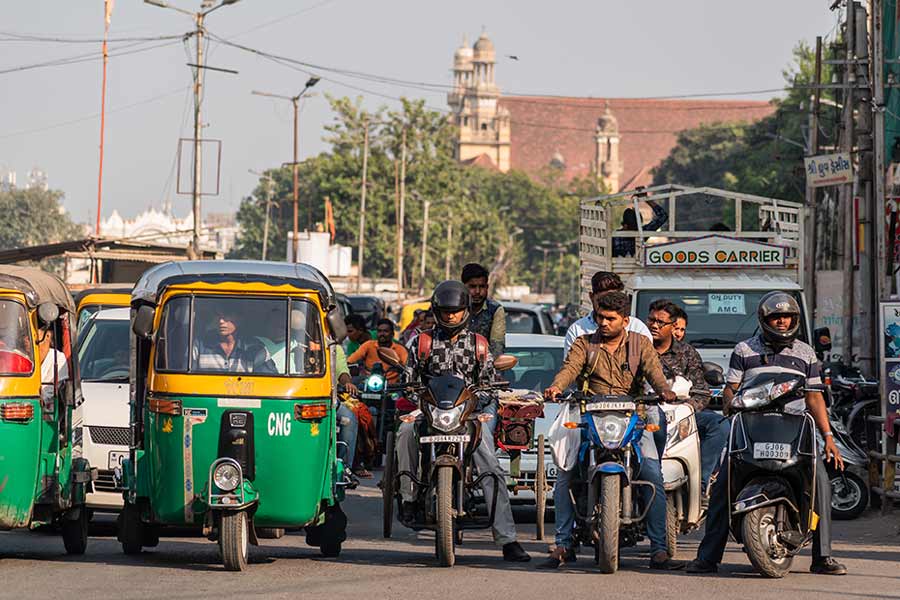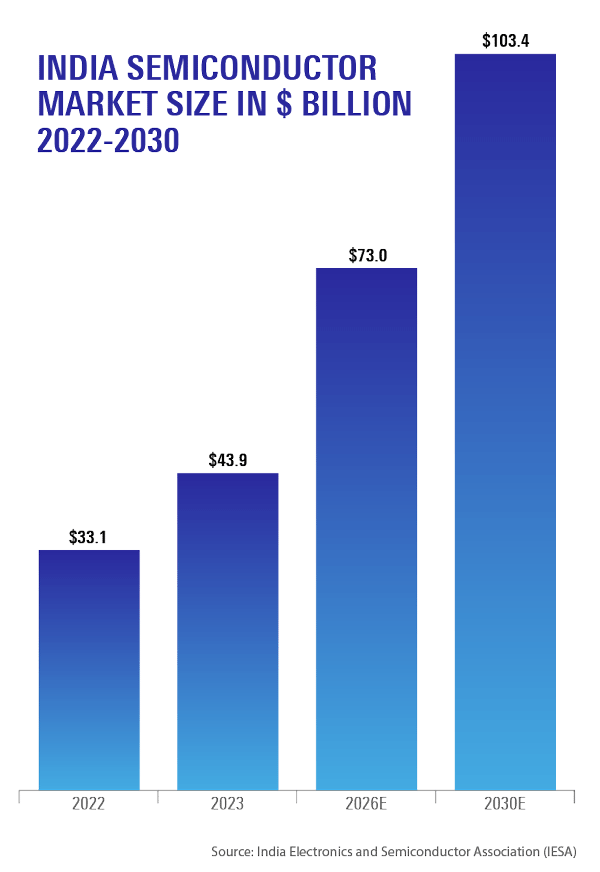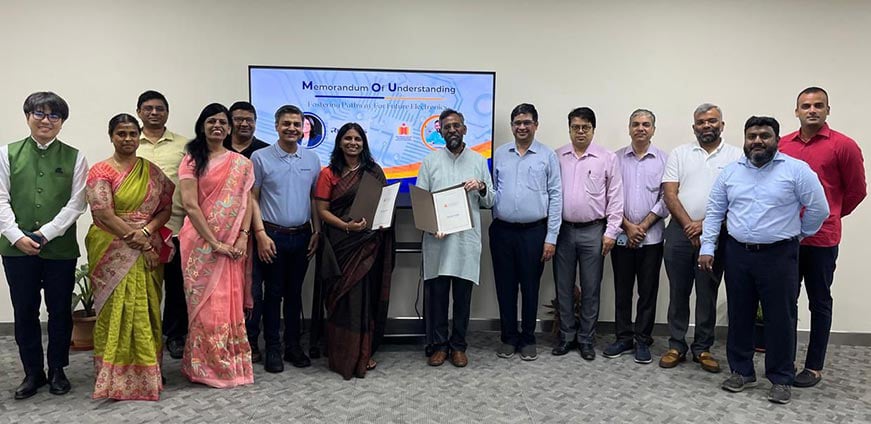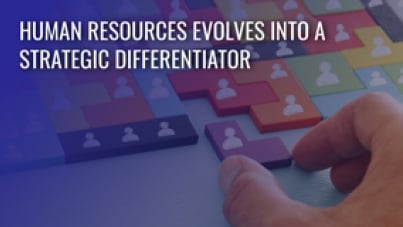Malini Narayanamoorthi joined Renesas as Senior Director of Engineering and Country Head of India in early 2023 to drive Renesas’ strategy in India and increase the company’s footprint on both business and engineering fronts. Malini assumed her role at a time when Renesas was sharpening its focus on India and has since helped drive a string of initiatives, including the expansion of Renesas’ India engineering design teams, collaborations with a number of universities, including a partnership with IIT Hyderabad, and a joint venture to build a semiconductor packaging facility in Gujarat with CG Power and Industrial Solutions Limited and Stars Microelectronics (Thailand) Public Co. Ltd.
As Malini works to expand Renesas India’s workforce, her own experience as a women leader has naturally led her to explore avenues for hiring more women engineers to create a workplace that enables diverse ideas and drives growth.
Most recently, Malini and her team supported Renesas’ CEO, Hidetoshi Shibata, who joined a roundtable with other global semiconductor leaders and Indian Prime Minister Narendra Modi at the inaugural SEMICON India conference in New Delhi. Renesas presented almost 50 different solutions in our booth at electronica India and SEMICON India. Malini herself participated in a panel discussion on automotive components at the event.
We spoke with Malini about India’s growth prospects, recruitment plans, and how those are helping Renesas meet its goal to increase company revenue to $20 billion by 2030.
Renesas: Why has India been such a focus for Renesas over the last few years? What growth opportunities has the company identified?
Malini: In 2020, our Hon'ble Prime Minister gave a kick-start to India’s vision of self-reliance (aka Athmanirbhar Bharath) through economic policies and incentives that included a focus on electronics and semiconductors.
In the 80s and 90s, we had Indian products like Videocon and Onida. But with the relaxation of import tariffs on foreign goods, Western companies gained a stronger presence, and as a result, many Indian brands gradually lost their market share. Thanks to this new ‘Make in India’ program promoting domestic manufacturing, we're back to a point where India wants to build its own products, and the government is fostering an ecosystem to make that happen. Semiconductors are one piece of that.
Renesas: What makes India a strong candidate as a design and manufacturing hub?
Malini: India has a huge talent pool that is well-educated, English-speaking, and skews to the younger side, with a number of engineering colleges churning out new grads. India is cost-competitive and as a geopolitically neutral country is easy to work with. All these make India a desirable place for companies like ourselves to grow.
Renesas: What does the Renesas footprint in India look like today, and what are your growth plans?
Malini: In India, we have our largest presence in Bengaluru, where we house engineering, sales, and marketing. We have a sales and marketing office in Delhi and an office in Pune which has both engineering and sales. Our newest offices are in Hyderabad and Noida, which are mostly dedicated to engineering. We are a minority stakeholder in a joint venture with CG Power, and the resulting assembly, testing, marking, and packaging facility is being built in Sanand, Gujarat.
Renesas India is growing across all locations, and we aspire to double the headcount we have today by 2025.
Renesas: How will an increase in headcount help you achieve your business goals?
Malini: One approach to catering to the India market is to approach design from the standpoint of local demand. For example, if you look at transportation in India, two-wheelers dominate the sector due to their accessibility and affordability. While much of the world develops technology for four-wheeled vehicles – and merely retrofits for the two-wheeler market – this represents a large underserved market with large local demand.

Given the increasing interest from startups and established companies to manufacture products in India, one might question the implications for Renesas. We have a broad portfolio of semiconductor chips that span automotive and industrial applications. On the automotive side, for example, Renesas is able to cater all the way from luxury vehicle offerings to the mass market. Renesas also has proof-of-concept teams that can design system-level solutions and collaborate with product companies to show them what they can do as they proceed through their product journey. Our system-level focus aligns with the government’s push toward building electronics in India.
I think that combination will enable us to make products tailored for India – but also the global market – and help Renesas India reach our aspiration of contributing to over 10 percent of total Renesas revenue by 2030.

Renesas: Historically, India has been known more for software development than hardware engineering. Is that changing?
Malini: In the early 2000s, when I was in engineering college, there were a huge number of software companies that came in for recruitment. Software jobs were just easier to find in India. Since then, a number of hardware companies have set up shop in India. Further, with India’s push to become self-reliant in electronics, universities are offering more semiconductor and design courses, which is yielding a contingent of fresh college grads with high-quality talent.
At Renesas India, we are growing all of our teams, including high-performance computing, embedded processing, analog and connectivity, and power, in addition to our software and digitalization team. We have a systems team as well that helps us build products, and we are growing our capabilities on that front as well.
Renesas: How is Renesas capitalizing on this evolving landscape to optimize recruitment?
Malini: Despite some softness in the chip market, we continue to forge ahead on recruitment and investing in our growth in India. Renesas was lesser known in India a few years ago, but that has changed significantly in the last couple of years as we focus on building high-performing engineering teams and continue to demonstrate our capabilities to the market. Of course, culture plays a huge part in employee retention as well. Hear all about working at Renesas in this video and the stories our employees shared on our dedicated Careers page.
Recently, Renesas India also has partnered with a number of universities to implement university programs and internship opportunities, which help them prepare for real-world engineering jobs.

Renesas: The most recent Renesas Business & Sustainability report mentions that 30 percent of new hires in India last year were women. What accounts for that?
Malini: We were very happy to see that 30 percent of the new hires last year in India were women. In India, 30 to 40 percent of engineering school graduates tend to be women, and so the talent pool exists. Often, women need a little extra confidence building to make changes to their work-life balance, be it a change in job, working through a promotion, or even returning after having a baby.
We are very supportive of having more women in Renesas, and when we interview female candidates, we typically have a woman from one of our teams talk with each of them to share their experiences at Renesas. The idea is to provide them with role models and show them that Renesas is a supportive place that welcomes and encourages women.
I would be failing if I did not mention our HR team’s initiative to hire and retain more women. Our Chief Human Resources Officer, Julie Pope, is a huge driving force on diversity initiatives and goes the extra mile to ensure the women at Renesas are supported in their career journeys.
We have also partnered with India’s largest career engagement platform for women, HerKey, which provides 'returnship' resources to women who have taken a break from their careers and want to re-enter the workforce. We would like to see our diversity numbers grow in the coming years as we expand our sites across India.
Renesas: When you advise job candidates, does that take you back to your early days as an engineer? What was the motivation for your career choice, and how is Renesas helping further your ambitions?
Malini: When I was a teenager, I was training to become a tennis player, but an injury caused me to re-focus on academics. Much like most students back then, I had to choose between engineering and medicine. Engineering was the obvious choice given my inclination toward math, computer science, and physics. As I went through my courses in engineering, I was always seeking out the big picture in the topics being taught. This system and big-picture thinking helps me in my job at Renesas every day.
What I loved about Renesas when I accepted this job – and still love – is that it does not limit me or pigeonhole me into a specific area. I’ve always been able to work across boundaries. That helps me use my strengths, while the constant learning culture here continues to shape my growth as a person, as a problem-solver, and as a leader.

